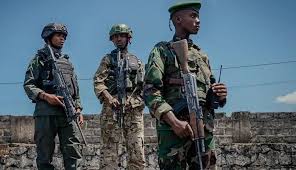Rwanda has announced plans to withdraw from the Economic Community of Central African States (ECCAS), deepening diplomatic tensions in the region over renewed violence involving M23 rebels in eastern Democratic Republic of Congo (DRC).
The decision came after Rwanda was denied the rotating chairmanship of the 11-member bloc during a meeting held on Saturday in Equatorial Guinea. Despite Kigali’s expectations, ECCAS retained Equatorial Guinea as chair — a move Rwanda’s Foreign Ministry has described as a “violation” of its rights within the community.
In a strongly worded statement, the Rwandan government accused the bloc of being manipulated by the DRC and said it saw “no justification for remaining in an organization whose current functioning runs counter to its founding principles.”
It remains unclear if Rwanda’s exit from ECCAS will take immediate effect or follow a formal withdrawal process. However, the development signals a further deterioration in relations between Rwanda and Congo, as regional and international efforts struggle to contain the rising tensions and violence in eastern Congo.
The Congolese presidency, in a statement issued shortly after the ECCAS meeting, welcomed the bloc’s stance, saying members had “acknowledged the aggression against the Democratic Republic of Congo by Rwanda and ordered the aggressor country to withdraw its troops from Congolese soil.”
The conflict in eastern Congo has intensified this year, with M23 rebels — who are widely believed to be backed by Rwanda — capturing two of the region’s largest cities. The offensive has led to thousands of deaths and renewed fears of a broader regional war. Rwanda has consistently denied involvement, maintaining that its forces are only protecting national security against ethnic Hutu militants operating in Congo, some of whom are accused of participating in the 1994 Rwandan genocide that killed about 800,000 to 1 million people, mostly ethnic Tutsis.
Despite these denials, the United Nations, the Congolese government, and several Western countries continue to accuse Rwanda of directly supporting the M23 insurgency with troops and arms.
Efforts by the United States, African leaders, and Qatar to mediate a peace deal have so far not yielded a breakthrough. The United States, in particular, views regional peace as vital to unlocking foreign investment in the DRC, which is rich in minerals such as cobalt, gold, copper, tantalum, and lithium — resources critical to the global energy and tech industries.
ECCAS, formed in 1983, aims to promote regional cooperation on security, economic development, and political stability among Central African states. Its member countries include Angola, Burundi, Cameroon, Central African Republic, Chad, Congo-Brazzaville, DRC, Equatorial Guinea, Gabon, Rwanda, and São Tomé and Príncipe.
Rwanda’s departure from the bloc, if finalized, could weaken its regional diplomatic standing and further isolate it as pressure mounts to end the M23 crisis. Analysts say the move also highlights the growing fragmentation among African multilateral organizations when it comes to managing conflict and diplomacy.
